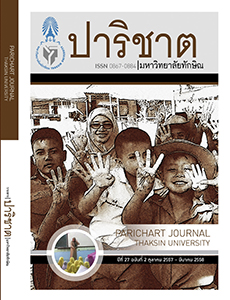Women in the Southern Border, Thailand : Overcoming the Myth.
Main Article Content
Abstract
การศึกษาผู้หญิงในจังหวัดชายแดนใต้ ส่วนใหญ่ถูกเขียน/พูด/นำเสนอ ในแง่ภาพลักษณ์ของความน่าเห็นใจ/น่าสงสาร ในฐานะผู้สูญเสียจากความรุนแรง และถูกทำให้หายไปในกระบวนการพัฒนา แต่เรื่องราวของผู้หญิงในเครือข่าย ชุมชนศรัทธา กลับมีความน่าสนใจเป็นอย่างมาก เพราะผู้หญิง ได้เข้ามามีบทบาท ในการขับเคลื่อนงานพัฒนาอย่างมั่นคงและย่องเงียบ กระทั่งสามารถเปิดพื้นที่ การมีส่วนร่วมได้มากขึ้น ท่ามกลางการยอมรับของแกนนำที่ส่วนใหญ่เป็นผู้ชาย แต่ควรมีการส่งเสริม/สนับสนุนผู้หญิงให้มากขึ้น โดยเฉพาะทักษะที่จำเป็นเกี่ยวกับ การจัดระบบชุมชน ระบบการจัดการและการประสานงาน รวมทั้ง การสร้างความ ตระหนักในเรื่องบทบาทผู้หญิง หรือบทบาทหญิงชายให้กับชาวชุมชนและผู้นำ กลุ่มต่าง ๆ ในเชิงนโยบายต้องสร้างความรู้ ความเข้าใจ และทัศนคติที่ดีเกี่ยวกับ ผู้หญิง สิทธิ การยอมรับ ความเสมอภาค สร้างพื้นที่การมีส่วนร่วมที่ พัฒนา ศักยภาพและเพิ่มโอกาส สิทธิทางสังคมให้กับผู้หญิง ในฐานะหุ้นส่วนสำคัญของ การพัฒนา และการสร้างสันติภาพ
Women in the Southern Border, Thailand : Overcoming the Myth.
Nathapong Chitniratna, Kanungnit Makchoochit, and Kokaew Wongphan
From the study, it appears that most of southernmost women’s stories are about their sympathy and mercy as victims of violence. Many cases are disappeared in the development process. Life history with women from Chumchonsattha Network shows that women are slowly, quietly, and firmly getting involved into the community development. Once they are fully participated in the community development, they would be acknowledged from other community leaders who are mostly men. Supporting and capacity building for women are necessary especially for community organization management and coordination system. In addition, awareness raising of women’s roles in development should be exercised with women, men, leaders, and community members. At policy, an advocacy should be focused on the community knowledge and attitudes towards women’s involvement in the community development. Knowledge and acknowledge of women’s rights and gender quality should be employed to prepare community members as well as leaders to welcome women’s participation. Besides, strengthening of women’s capacity will increase their opportunities as crucial members in the community development and peace building.


